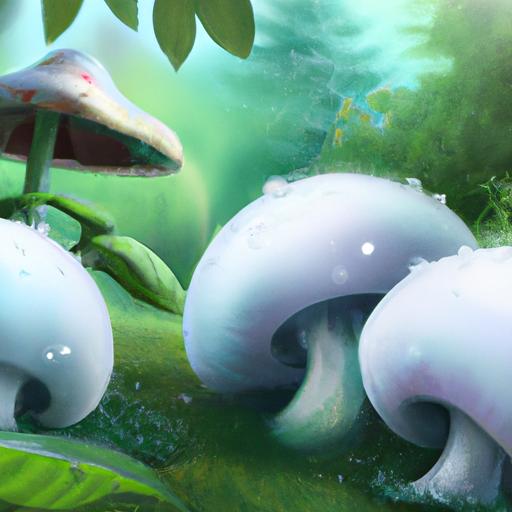Button mushrooms are a popular and tasty ingredient in many dishes, but do you know if they can give you diarrhea? Eating too many button mushrooms can indeed cause diarrhea, but there are ways to reduce your risk.
In this article, we’ll explore what button mushrooms are, why eating too many can cause diarrhea, how many mushrooms you can eat before experiencing diarrhea, and who is most at risk of getting diarrhea from eating button mushrooms.
We’ll also discuss the symptoms of diarrhea from eating button mushrooms, how to reduce the risk of diarrhea from eating button mushrooms, and any other gastrointestinal issues from eating too many button mushrooms.
So if you are interested in learning more about the potential risks of eating button mushrooms, read on!
Table of Contents
Short Answer
Button mushrooms are generally safe to eat and do not cause diarrhea.
However, it is possible to have an allergic reaction or sensitivity to button mushrooms which can lead to gastrointestinal symptoms such as diarrhea.
Additionally, if button mushrooms are not cooked properly or stored in a way that increases their risk of becoming contaminated, they can cause food poisoning which can lead to diarrhea.
Therefore, it is important to make sure button mushrooms are cooked thoroughly and stored properly in order to avoid any potential issues.
What are Button Mushrooms?
Button mushrooms (Agaricus bisporus) are a type of mushroom found in many grocery stores and supermarkets.
They are one of the most popular types of mushrooms in the United States and are often used in a variety of dishes.
They are also known as white mushrooms, table mushrooms, or even regular mushrooms.
Button mushrooms have a mild flavor and a firm, meaty texture.
They can be used in soups, stews, casseroles, and many other dishes.
Button mushrooms can also be eaten raw in salads or sandwiches.
Button mushrooms are low in calories and high in fiber, vitamins, minerals, and antioxidants.
They are a good source of potassium, vitamin C, riboflavin, and other nutrients.
Button mushrooms also contain polyols, which are naturally occurring sugar alcohols.
Polyols can cause digestive issues in some people, leading to symptoms such as gas, bloating, and diarrhea.
Why Can Eating Too Many Button Mushrooms Cause Diarrhea?

Eating too many raw button mushrooms can cause diarrhea in some people due to the high levels of fiber and polyols found in the mushrooms.
Fiber is a type of carbohydrate that is not broken down during digestion, which can lead to digestive issues like gas, bloating, and diarrhea.
Polyols are sugar alcohols that can cause digestive distress in some people, leading to diarrhea.
When these components are consumed in large amounts, they can cause an increase in intestinal fluid and gas, which can lead to diarrhea.
The fiber and polyols found in button mushrooms can be especially hard to digest, resulting in more intense digestive symptoms.
Additionally, button mushrooms contain a compound called agaritine, which can also lead to digestive issues in some people.
It is important to note that not everyone will experience digestive issues from eating raw button mushrooms.
These issues typically occur in people who are sensitive to the components found in the mushrooms.
It is best to cook the mushrooms before consuming them, as this can reduce the risk of diarrhea.
How Many Button Mushrooms Can You Eat Before Experiencing Diarrhea?
When it comes to eating button mushrooms, it is important to understand that the amount of mushrooms that can be consumed before experiencing diarrhea is highly individualized and can depend on a few factors.
In general, it is best to consume mushrooms in moderation and, when possible, to cook them before eating.
This is because cooking mushrooms can reduce the amount of fiber and polyols, two compounds that can cause digestive issues when eaten in large quantities.
For those who are more sensitive to the effects of button mushrooms, it is best to start with small amounts and increase gradually.
It is also important to pay attention to the bodys reaction to the food.
If any digestive symptoms occur, such as stomach pain, bloating, diarrhea, or nausea, it is best to reduce the amount of mushrooms consumed or to switch to cooked mushrooms.
The amount of button mushrooms a person can eat before experiencing diarrhea can also depend on the other foods they are consuming.
Eating too many mushrooms alongside other fibrous foods or foods high in polyols can increase the risk of digestive issues.
It is best to focus on eating a balanced diet with moderate amounts of button mushrooms and other nutritious foods.
Finally, it is important to remember that everyones digestive system is different and the amount of mushrooms that one person can consume before experiencing diarrhea may be different for another.
It is best to listen to the body and to adjust the mushroom portion size accordingly.
What Are the Symptoms of Diarrhea from Eating Too Many Button Mushrooms?

When it comes to eating too many button mushrooms, the most common symptom of diarrhea is loose, watery stools.
This is due to the high levels of fiber and polyols found in the mushrooms, which can irritate the digestive system and lead to diarrhea.
Other symptoms of diarrhea from eating too many button mushrooms may include abdominal cramping, bloating, nausea, and fatigue.
In some cases, eating too many button mushrooms may even cause vomiting.
It is important to note that the severity of these symptoms can vary from person to person.
Some people may experience mild digestive discomfort, while others may experience more severe symptoms.
Additionally, the symptoms may last anywhere from a few hours to a few days, depending on how many mushrooms were consumed.
If you experience any of these symptoms after eating button mushrooms, it is important to drink plenty of fluids and rest.
In most cases, the symptoms should resolve on their own, though more severe cases may require medical attention.
Who is Most at Risk of Getting Diarrhea from Eating Button Mushrooms?
Anyone can experience digestive issues from eating too many raw button mushrooms, but there are certain groups of people who are more likely to have a reaction.
Those with pre-existing digestive issues, such as IBS or Crohns disease, are more likely to experience diarrhea when consuming raw button mushrooms.
People with weakened immune systems may also be more prone to digestive issues from eating raw button mushrooms.
Additionally, those who are sensitive to certain compounds in the mushrooms, such as fiber and polyols, may experience digestive issues when eating them raw.
It is important to note that the risk of experiencing digestive problems increases with the amount of mushrooms eaten.
How to Reduce the Risk of Diarrhea from Eating Button Mushrooms

When it comes to avoiding diarrhea from eating button mushrooms, the best advice is to cook them before consuming them.
Cooking helps to break down the fiber and polyols in the mushrooms, reducing the risk of digestive issues.
Additionally, eating button mushrooms in moderation can help to limit the risk of diarrhea.
Eating too many mushrooms in one sitting can cause digestive issues, so it is best to limit consumption.
When cooking button mushrooms, there are a few different methods that can be used.
The most popular method is to saut the mushrooms in a pan with a small amount of oil or butter.
This helps to soften the mushrooms and make them easier to digest.
Additionally, you can boil the mushrooms for a few minutes to soften them, or roast them in the oven for a few minutes.
When boiling or roasting, be sure to monitor the mushrooms to make sure they do not overcook.
Another way to reduce the risk of diarrhea from eating button mushrooms is to pair them with other ingredients.
Adding butter or oil to the mushrooms while cooking can help to soften them and make them easier to digest.
Additionally, pairing the mushrooms with other vegetables, such as onions and peppers, can help to reduce the amount of fiber and polyols consumed.
This can help to reduce the risk of digestive issues.
Finally, it is important to stay hydrated when eating button mushrooms.
Drinking plenty of water can help to reduce the risk of diarrhea from eating button mushrooms.
Additionally, drinking a cup of hot tea or warm water with lemon can help to soothe the digestive system and reduce the risk of diarrhea.
By following these tips, you can reduce the risk of diarrhea from eating button mushrooms.
By cooking the mushrooms in different ways, pairing them with other ingredients, and staying hydrated, you can enjoy button mushrooms without worrying about digestive issues.
Are There Any Other Gastrointestinal Issues from Eating Too Many Button Mushrooms?
In addition to diarrhea, eating too many raw button mushrooms can also cause other gastrointestinal issues such as bloating, abdominal pain and cramps, nausea, and vomiting.
The high levels of fiber and polyols in the mushrooms can cause these issues in some people, especially those who are sensitive to these compounds.
It is important to cook button mushrooms before consuming them to reduce the risk of these issues.
Cooking the mushrooms helps to break down the tough fibers and polyols, making them easier to digest.
Additionally, cooking the mushrooms can help to reduce the amount of antinutrients, which can disrupt the absorption of certain minerals and vitamins in the body.
In some cases, those with sensitive gastrointestinal systems may need to avoid button mushrooms altogether, as these compounds can be difficult to digest even when cooked.
It is best to speak to a doctor or nutritionist to find out what works best for your digestive system.
Final Thoughts
Button mushrooms can be a delicious and nutritious addition to your diet, but its important to remember that eating too many raw button mushrooms can cause diarrhea in some people.
If you are considering eating raw button mushrooms, it is best to cook them first to reduce the risk of experiencing diarrhea.
Be aware of the symptoms and who is most at risk of experiencing gastrointestinal issues from eating too many button mushrooms.
If you experience any bothersome symptoms, be sure to consult your doctor.

